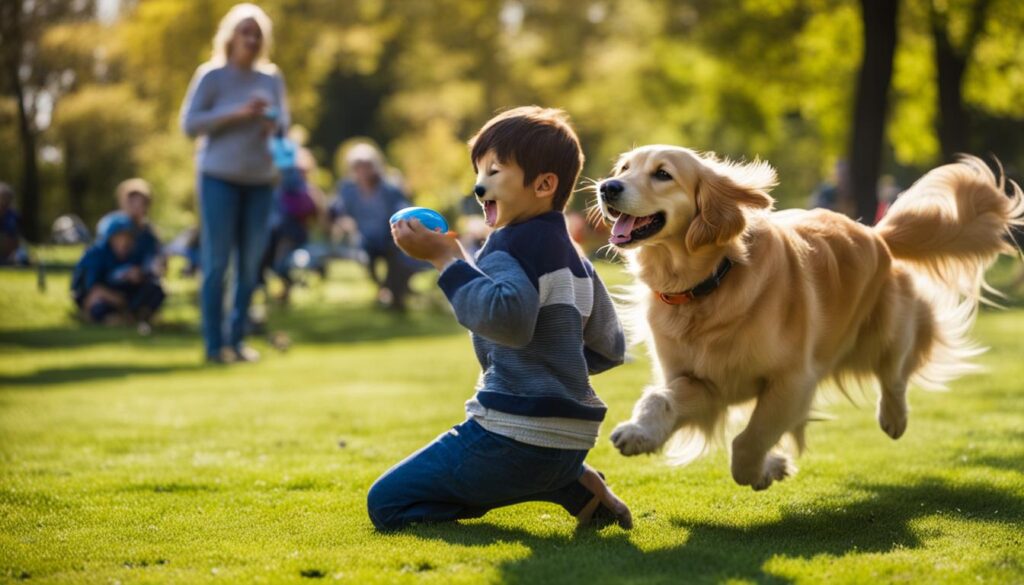As a potential dog owner or pet lover, you may be wondering whether Golden Retrievers are dangerous dogs. These lovable and friendly canines are incredibly popular, but like any dog breed, they come with their unique traits and personality quirks that must be approached with caution.
While Golden Retrievers are generally known for their gentle and loving temperament, there are potential risks associated with their behavior that must be considered. In this section, we will explore the question of whether Golden Retrievers can be considered dangerous dogs, diving into the facts and factors surrounding their behavior to help you make an informed decision.
Key Takeaways
- Golden Retrievers are typically known for their friendly and gentle nature.
- However, there are potential risks associated with their behavior that must be considered.
- Understanding the breed’s temperament and training needs can help prevent any potential risks.
- Proper socialization is crucial for Golden Retrievers to ensure they interact well with humans and other animals.
- Ultimately, whether a Golden Retriever is a dangerous dog depends on individual circumstances, such as their upbringing and environment.
Understanding Golden Retriever Behavior
When it comes to dogs, Golden Retrievers are known for their friendly and easy-going nature. They are often considered to be one of the most affectionate dog breeds and make great family pets.
The temperament of Golden Retrievers is typically gentle, patient, and friendly. They are known for being sociable dogs that get along well with children and other pets. However, it is still essential to supervise the interactions between your Golden Retriever and other animals, especially if there’s a significant size difference.
While Golden Retrievers are generally not prone to aggression, it’s important to note that any dog can become aggressive in certain situations. Factors that may influence their behavior towards people or other animals include training, socialization, genetics, and the dog’s past experiences.
Quote: “While Golden Retrievers are generally not aggressive, it’s essential to keep in mind that they are still animals and can become anxious or aggressive if they feel threatened or scared.”
-Dr. Rosie Gilbert, DVM
It’s crucial to socialize your Golden Retriever from an early age, exposing them to different environments, people, animals, and sounds. Proper training is also essential for preventing any undesirable behavior. Consider enrolling your dog in obedience classes, which can help establish good behavior and reinforce positive interactions with people and other pets.


The Takeaway
Golden Retrievers are known for their gentle and friendly nature, but this does not guarantee that they will always exhibit perfect behavior. Proper training and socialization are essential for helping your Golden Retriever develop good behavior and preventing any undesirable aggression. Even though Golden Retrievers are generally not aggressive dogs, each dog is unique and may react differently in various situations. So be responsible, take the time to train and socialize your dog, and always provide them with the care and attention they need.
Training and Socialization for Golden Retrievers
Proper training and socialization are crucial for any dog, and Golden Retrievers are no exception. This breed is known for its friendly and affectionate nature, but without proper training, they can display unwanted behaviors.
Golden Retrievers are intelligent dogs and thrive on positive reinforcement training methods. They respond well to rewards-based training, so it’s essential to use treats, praise, and playtime as positive reinforcement for desired behaviors.
When it comes to training a Golden Retriever, it’s essential to take their breed characteristics into consideration. Golden Retrievers are bred to be hunting dogs, which means they have a natural prey drive, and they may be more inclined to chase small animals like squirrels or cats. Training should focus on redirecting this behavior and reinforcing good habits.
Additionally, Golden Retrievers are known for their love of water and swimming. It’s important to introduce them to water and swimming early on to encourage positive associations and safety around water.
Socialization is also key to raising a well-behaved Golden Retriever. Socialization should start early to ensure they are comfortable around people, animals, and new environments. Positive exposure to different people, animals, and situations will help prevent any potential risks associated with their behavior.
Golden Retriever Training Tips:
- Use positive reinforcement training methods
- Be patient and consistent with your training
- Redirect their prey drive towards toys and other objects
- Introduce them to water and swimming early on
With proper training and socialization, Golden Retrievers can be wonderful and well-behaved companions. Make sure to give them plenty of love and attention, and they will reward you with loyalty and affection in return.


Conclusion
In summary, after exploring the behavior, temperament, and training needs of Golden Retrievers, we can conclude that they are generally not considered dangerous dogs. While any breed can display aggressive behavior, Golden Retrievers are known for their friendly and gentle disposition towards humans and other animals.
However, it is important to note that lack of proper training and socialization can contribute to negative behavior in any breed, including Golden Retrievers. As a responsible dog owner or adopter, it is crucial to understand the breed characteristics and provide appropriate training and socialization to prevent any potential risks associated with their behavior.
Overall, Golden Retrievers make great family pets and are beloved by many for their loyalty and affectionate nature. By taking the time to properly care for and train your Golden Retriever, you can help ensure a safe and positive relationship with your furry companion.
FAQ
Are Golden Retrievers inherently dangerous dogs?
No, Golden Retrievers are not inherently dangerous dogs. They are known for their friendly and gentle nature. However, like any dog breed, individual temperament and behavior can vary. It is important to consider training, socialization, and the environment in which they are raised.
What are the risks associated with Golden Retrievers?
While Golden Retrievers are generally friendly and gentle, there are some risks to be aware of. Like any dog, they can become aggressive if they are not properly trained, socialized, or if they are subjected to neglect or abuse. They can also become protective of their families. It is essential to provide them with adequate training and socialization to prevent any potential risks.
How do Golden Retrievers typically behave?
Golden Retrievers are known for their friendly and outgoing nature. They are generally eager to please, making them highly trainable. They are often patient with children and other pets, and they tend to get along well with strangers. However, individual behavior can vary, and proper training and socialization are vital.
Can Golden Retrievers display aggression?
While aggression is not common in Golden Retrievers, it can occur in certain individuals. Aggression may stem from various factors such as fear, possessiveness, or territorial behavior. It is crucial to address any signs of aggression early on and seek professional help if needed.
How can training and socialization help prevent potential risks associated with Golden Retrievers?
Training and socialization play a crucial role in shaping a Golden Retriever’s behavior. Proper training can teach them obedience, establish boundaries, and prevent any undesirable behavior. Socialization exposes them to various people, animals, and environments, helping them become well-rounded and well-adjusted dogs.
What are the key characteristics of Golden Retrievers that affect their training?
Golden Retrievers are intelligent, eager to please, and highly trainable. They respond well to positive reinforcement techniques such as rewards and praise. However, they can also be sensitive, so it’s important to use gentle, patient, and consistent training methods.

